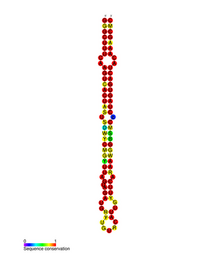Biology:miR-224
| miR-224 | |
|---|---|
 Conserved secondary structure of miR-224 microRNA precursor | |
| Identifiers | |
| Symbol | miR-224 |
| Alt. Symbols | MIR224 |
| Rfam | RF00680 |
| miRBase | MI0000301 |
| miRBase family | MIPF0000088 |
| NCBI Gene | 407009 |
| HGNC | 31604 |
| OMIM | 300769 |
| RefSeq | NR_029638 |
| Other data | |
| RNA type | miRNA |
| Domain(s) | Mammalia |
| GO | 0035195 |
| SO | 0001244 |
| Locus | Chr. X q28 |
| PDB structures | PDBe |
miR-224 is a family of microRNA precursors found in mammals, including humans. The ~22 nucleotide mature miRNA sequence is excised from the precursor hairpin by the enzyme Dicer.[1]
Function
miR-224, being located on the X-chromosome, is thought to be active in mammalian ovaries, and possibly responds to TGF beta 1.[2] A target of miR-224 has been predicted to be SMAD4. Experimental evidence has shown that while the SMAD4 mRNA level is unchanged, increased miR-224 expression decreases concentration of SMDA4 protein in murine granulosa cells.[3] This is consistent with post-transcriptional miRNA regulation.[2]
Role in cancer
miR-224 has been noted as the most upregulated microRNA in hepatocellular carcinoma.[4] The same study identified a target of mir-224 as apoptosis-inhibitor 5 (API-5).[4]
miR-224 has also been linked with pancreatic ductal carcinoma, where it is thought to repress CD40 expression in cancer cells.[5]
References
- ↑ "microRNAs: tiny regulators with great potential". Cell 107 (7): 823–6. December 2001. doi:10.1016/S0092-8674(01)00616-X. PMID 11779458.
- ↑ 2.0 2.1 "MicroRNA control of ovarian function". Animal Reproduction 7 (3): 129–133. July 2010. PMID 21666774.
- ↑ "MicroRNA-224 is involved in transforming growth factor-beta-mediated mouse granulosa cell proliferation and granulosa cell function by targeting Smad4". Molecular Endocrinology 24 (3): 540–51. March 2010. doi:10.1210/me.2009-0432. PMID 20118412.
- ↑ 4.0 4.1 "Profiling microRNA expression in hepatocellular carcinoma reveals microRNA-224 up-regulation and apoptosis inhibitor-5 as a microRNA-224-specific target". The Journal of Biological Chemistry 283 (19): 13205–15. May 2008. doi:10.1074/jbc.M707629200. PMID 18319255.
- ↑ "Involvement of CD40 targeting miR-224 and miR-486 on the progression of pancreatic ductal adenocarcinomas". Annals of Surgical Oncology 16 (8): 2339–50. August 2009. doi:10.1245/s10434-009-0531-4. PMID 19475450.
 |

